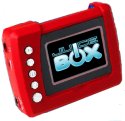JuiceBox gets Linux jolt
Feb 15, 2006 — by LinuxDevices Staff — from the LinuxDevices Archive — 9 views [Updated Thurs., Feb. 16, 2005] — Another defenseless gadget has fallen prey to the relentless march of the Penguinistas. Tim Riker's eLinux.org website has published extensive, detailed instructions for creating a cartridge that can boot any unmodified Mattel JuiceBox into a Linux-based… environment.
[Updated Thurs., Feb. 16, 2005] — Another defenseless gadget has fallen prey to the relentless march of the Penguinistas. Tim Riker's eLinux.org website has published extensive, detailed instructions for creating a cartridge that can boot any unmodified Mattel JuiceBox into a Linux-based… environment.
(Click for larger view of JuiceBox)
The JuiceBox is a $70 teen-targeted PMP (portable media player) powered by a 66MHz, 16/32-bit ARM7 processor. It has a 2.7-inch 240×160 color LCD, 2MB or 8MB of RAM (depending on the model), and 8MB of Flash, expandable through an SD/MMC slot. The device also has a “JuiceWare” slot, intended for use with an optional mp3 player module, photo-viewing module, and pre-packaged video modules with titles like “the triple-crown of skateboarding.”
The hack involves cutting traces and soldering bridges on a JuiceBox “MP3 kit” module, and then trimming the edge slots off an xD memory card and delicately epoxying it into place within the module. The hack also involves soldering serial and JTAG port connector wires into the JuiceBox itself, and then copying a bootloader, uClinux kernel, and ramdisk to the JuiceBox's SD/MMC card. A soon-to-be-released, GPL-licensed “flash_program” application is then loaded into memory and executed on the JuiceBox, to copy these items to the modified module.
The payoff is a module that can be used to boot an unmodified JuiceBox into uClinux, and then bask in the calm dignity of dmesg output, surely an improvement, if the JuiceBox website is any indication.
More JuiceBox hacking details can be found at the eLinux.org Wiki, along with a MessageBoard discussing other possible ways to spike the JuiceBox with open source software, such as USB device port and CueCat barcode reader drivers.
For the precocious teen with everything, eLinux.org also hosts information on hacking the Zipit chat handheld, Fossil FX3002 “Dick Tracy” wristwatch, and Fisher-Price Pixter multimedia system.
This article was originally published on LinuxDevices.com and has been donated to the open source community by QuinStreet Inc. Please visit LinuxToday.com for up-to-date news and articles about Linux and open source.